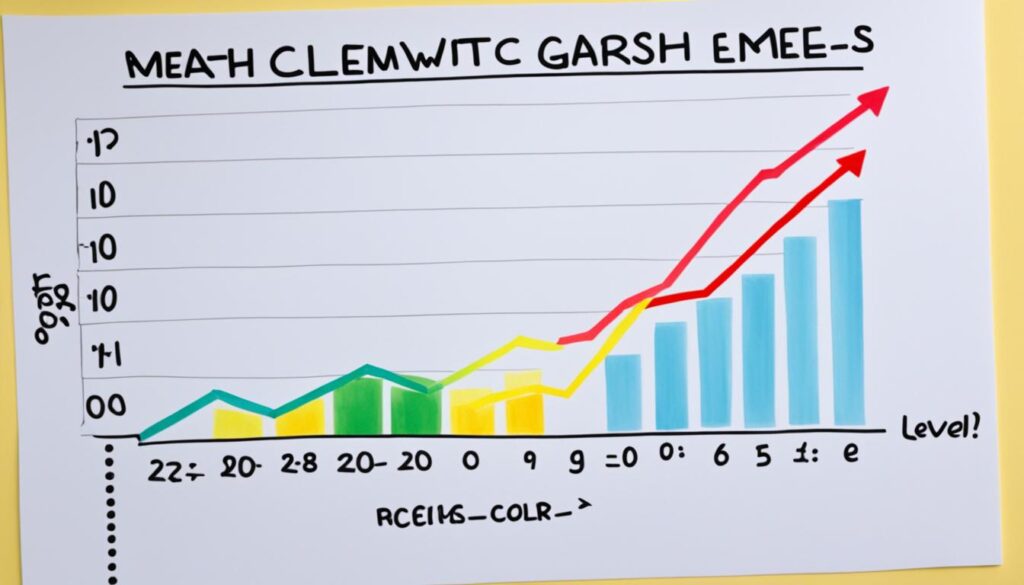Did you used to hate math in school? Those numbers, equations, and formulas could feel impossible. This struggle affects a lot of people, keeping them from success in work and money matters. But there’s hope. You can get better at math and feel more sure of yourself when facing math challenges.
Imagine sitting at your desk with a tough math problem. Instead of getting scared, you get excited. You’ve been going to EMS Tutoring, where a great tutor helps you. They make math problems easier by showing you step by step how to solve them.
Looking to improve your math skills, you find lots of great resources online. There are courses, apps, and games that let you practice math in a fun way. You start enjoying learning math because it’s not just studying; it’s like solving puzzles and playing games.
Learning math is also about a good attitude. You start to see how math is all around us. From money to percentages, math is key to everyday life. Seeing the practical side of math makes you like it more.
Improving your math can be tough sometimes, like with hard word problems. But you use a tip from your tutor: break the problem into smaller parts. Doing this makes big problems feel much more doable.
With each victory, you become more confident. You take things one step at a time and turn to your tutor when needed. They help make hard math make sense, boosting your confidence even more.
You also start using tech to help you learn math. Apps and online courses make learning more personal. They show math in ways that are easier to understand than from a book alone.
Practicing every day makes your math skills better. You get used to seeing patterns and solving problems becomes easier. This routine really works to improve your skills.
You also learn that it’s important to really understand each math topic before moving on. You watch videos, talk about math, and do practice problems. This solid foundation helps you learn new things more easily.
Your math journey is not just about getting really good at math. It’s about growing, feeling more confident, and understanding math better. Stick with it and with support, you can do great in math and in other parts of life.
Key Takeaways:
- Math tutoring can provide guidance and support in navigating complex concepts.
- Utilize online courses, apps, and platforms as valuable learning resources.
- Connect math to real-life situations to understand its practical relevance.
- Break down word problems into manageable steps to enhance problem-solving skills.
- Embrace technology for personalized and engaging math learning experiences.
Understanding the Importance of Basic Math Skills
Before you learn advanced math, you must be good at basic math. Basic math is like a stepping stone. It helps you learn harder math and use math in daily life. These skills are key for both school and when you grow up.
Basic math means things like adding, subtracting, multiplying, and dividing. It’s also about fractions, decimals, and shapes. Getting good at these sets you up to understand more difficult math later.
Think about adding and subtracting. You use these to solve math problems every day. Multiplication and division help you work with big numbers. Percentages, fractions, and decimals explain parts of a whole. Spatial reasoning is about shapes and measurements.
If you don’t know these basics, advanced math is hard to understand. Picture solving an algebra problem without knowing how to add or use fractions!
So, knowing your basic math really well is crucial. It lets you take on math challenges with ease. You can also make smart choices using numbers, and you’re better at understanding math ideas.
How to Improve Math Skills
To get better at math, you need to focus and practice regularly. Here’s how you can boost your math skills:
- Gain a thorough understanding of math concepts: Use things like math manipulatives to make fuzzy ideas clear.
- Make math practice enjoyable and engaging: Turn learning into fun by using games and interactive methods.
- Connect math to daily life situations: Show how math is used in real life to understand its importance.
- Implement daily math practice: Make practicing math a part of your everyday routine to get better.
- Develop problem-solving skills: Work on solving problems step by step to get good at it.
- Set realistic goals: Decide what you want to achieve with math and get help if you need it.
- Focus on one concept at a time: Understand each math topic well before moving on to the next.
Why Using Math Manipulatives is Beneficial
Math manipulatives are physical tools that let students see and touch math ideas. For instance, using blocks to show math problems can make them easier.
Studies show that doing math with tools and games makes learning better. It keeps students interested and helps them remember more. So, by making math fun and hands-on, everyone starts to like it more and becomes more confident.
Follow these steps to get good at math. Focus on one thing, set goals, and practice a lot. These tips will help you with math in everyday life and tests. Stay committed, and success in math will follow.
Embracing Technology for Math Skills Improvement
In today’s world, technology offers many ways to improve math skills. You can use online math courses, educational apps, and math learning platforms. These tools can boost your learning and make you better at math.
Online math courses are great because you can learn at your own speed and cover lots of topics. Platforms like EMS Tutoring mix things up with interactive lessons. This makes learning math fun and caters to different learning styles. You can start with the basics and move on to harder topics as you get more comfortable.
Educational math apps are fun and engaging. There are many out there, so you can pick what you like. Apps like ABC Mouse, Prodigy Math Game, and Khan Academy Kids mix math with games. This makes learning enjoyable and helps keep you motivated.
Math learning platforms put you in touch with others who are learning, too. You can talk with them, ask questions, and share ideas on forums. This helps you understand math better. Plus, you can learn different ways to solve problems.
Seeing data visually also helps a lot. Graphs and charts make numbers easier to understand. They help you get a better handle on math concepts and improve how you work with numbers.
To show how helpful tech is for learning math, check out this table. It lists the benefits of online math courses, educational apps, and math learning sites:
| Math Education Technology | Features | Advantages |
|---|---|---|
| Online Math Courses | – Self-paced learning – Comprehensive course materials – Accessible from anywhere |
– Flexibility in learning – Covers various math topics – Convenient and accessible |
| Educational Apps | – Gamified learning – Interactive activities – Personalized feedback |
– Engaging and motivating – Tailored to individual needs – Immediate feedback on performance |
| Math Learning Platforms | – Online community support – Discussion forums – Experienced tutors |
– Collaborative learning environment – Access to expert guidance – Peer-to-peer learning opportunities |
Technology can do a lot to improve math skills and make learning more enjoyable. It offers tailored lessons, fun practice, and a community of learners. With these tools, you have many chances to grow your math knowledge.

Importance of Number Sense
Getting good at math needs more than memorizing. It’s about truly knowing numbers and their connections. This makes adding up and problem-solving easier. You learn ways to figure out answers, not just remember them. This skill helps understand the big ideas in math.
Knowing numbers well is like a math superpower. It helps with big math problems and calculations. You get good at seeing how numbers fit together, finding patterns, and figuring things out easily. This makes you confident in math and better at solving tough problems.
One big plus of being great with numbers is doing math in your head. It’s about being quick and right without a calculator. You’ll use this everywhere, from sales shopping to checking a restaurant bill.
Also, being good with numbers is key for solving problems. It means knowing how numbers work to solve puzzles smartly. You’ll learn to tackle hard problems step by step and find the best way to solve them.
You can get better at numbers in many ways. Hands-on math like using objects or solving problems helps a lot. So does using math in daily life, like planning or looking at information. This all helps sharpen your number skills.
“Number sense is the ability to think and work flexibly with numbers, to understand their quantities and properties, and to comprehend how they relate to one another.” – National Council of Teachers of Mathematics
Enhancing Number Sense
Here are some tips to improve your number skills:
- Practice doing math in your head often to get faster and better at it.
- Work on real-life problems that need you to think with numbers, like making a budget or measuring for a recipe.
- Have fun by looking for patterns in numbers, like in puzzles or games.
- Learn about fractions, decimals, and percentages by connecting them to real things and pictures.
- Try out apps or games that make learning numbers fun and interactive.
Image: Number sense in action
| Benefits of Number Sense | Strategies for Enhancing Number Sense |
|---|---|
|
|
Breaking Down Complex Problems
Big math problems might seem scary at first. But don’t fear them. By taking them apart step by step, they become easier. Here’s a guide to handling challenging math:
Identify the Conceptual Framework
Start by looking at what the problem is really about. Understanding its core helps in knowing how to solve it.
Isolate Unknown Variables
Then, focus on the parts you don’t know. This step makes working towards a solution clearer.
Simplify the Problem
After noting those unknowns, simplify the whole issue. Break it into smaller problems that are easier to manage. This step cuts down on mistakes and makes solving it realistic.
Find the Most Straightforward Method
Look for the easiest way that fits your style. This might involve using known formulas, equations, or strategies.
By learning how to deconstruct the tough stuff, you build your problem-solving skills. This makes handling complex math much easier.

“In mathematics, breaking down complex problems into simpler steps is an essential skill. It allows you to approach challenging equations with confidence and systematically find the solution. Practice breaking down problems and simplify them to enhance your mathematical problem-solving abilities.” – Emma Johnson, Math Tutor at EMS Tutoring
Regular and Consistent Practice
Improving your math skills requires practicing every day. Spend time working on math problems regularly. This activity helps you understand the concepts better.
Talking to math tutors can also help a lot. They are experts at making hard math easier to understand. Their help can improve how quickly you learn math.
Consider signing up for math courses too. These are made to teach math that you use in your daily life. They teach you real-life math like handling money. This makes learning math feel useful and practical.
By making math practice part of your daily life, you’ll get better at it. Daily sessions, tutors, or courses each help in different ways. But, the key is to always keep trying, no matter the method.

| Benefits of Regular and Consistent Practice: |
|---|
| 1. Reinforces math concepts |
| 2. Builds proficiency and confidence |
| 3. Provides guidance and support from math tutors |
| 4. Develops practical math skills through functional math training courses |
| 5. Enhances problem-solving abilities |
Understand New Concepts Before Moving On
To really learn math, it’s crucial to get the current concepts first. If you rush to new topics, you might get lost and slow down your learning.
Understanding math is like building a house. You have to lay a strong foundation first. Take your time to really get each topic. This way, you not only understand better but also get better at math in general.
Use different tools to make math concepts clearer:
- Video tutorials: Watching videos can make learning math easier. Check out Ems Tutoring for great video tutorials on many topics.
- Math discussions: Talking about math with others can really help. Join group study sessions or discussions. This lets you see math in new ways.
- Sample exercises: Practicing is crucial in math. Do extra problems and exercises. This will help you really understand and use what you’ve learned.
- Problem-solving techniques: Learn new ways to solve problems. Finding the best strategy for each type of problem is key. It makes you better at problem solving and more confident in your skills.
Don’t rush through topics. It’s important to fully understand each one. This strong base will help you tackle new challenges. You’ll feel more confident because you’ll see how everything connects.
Establishing a Solid Math Routine
Creating a regular math routine is key to becoming skilled. It helps you solve problems better and see patterns easier. Here’s how to make a math routine work for you:
1. Practice Math Problems
Work on math problems often to understand concepts and improve your speed. Set a daily time for math. Doing different problems regularly makes you better at solving them.
2. Review Concepts
Take time to go over math you’ve learned before. This keeps your knowledge fresh. Use books, online help, or apps to make sure you really ‘get’ math ideas.
3. Develop Problem-Solving Techniques
Learn to solve math problems smartly for any topic. Look at how you solve problems and find ways to do it faster. This makes you better at finding solutions quicker.
4. Enhance Pattern Recognition Skills
Seeing patterns is important in math. Practice finding patterns in numbers, shapes, and math steps. This makes you better at solving problems and understanding math deeply.
“Making a solid math routine is as important as a strong house foundation. Good practice, reviewing, smart problem-solving, and pattern skills set you up for math success and build your confidence.”
Stick to a math schedule to get better and more confident. Doing math often and smartly can make you great at it. With a solid routine, you’ll excel in math and feel more at ease with numbers.
Conclusion
Improving your math skills takes time and effort. With dedication and the right steps, you can get better at math. It’s important to first focus on basic math. Try to be really good at addition, subtraction, multiplication, division, and other key areas. This will help you understand harder math later on.
Technology is a big help in learning math today. Online courses and apps offer ways to learn that fit you personally. They make math more fun and easy to understand. It’s also important to have a good sense of numbers. This skill lets you look at numbers in different ways and solve problems quickly in your head.
To get better at math, break big problems into smaller parts. Create a routine that includes practicing regularly. This kind of regular practice is key. Doing lots of problems and seeing patterns helps you get really good at math. And always remember, with hard work and the right tools, you can do great in math and in everything else.



